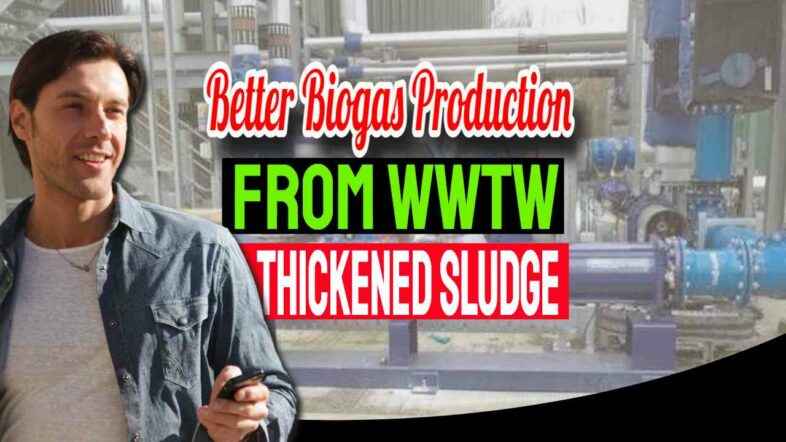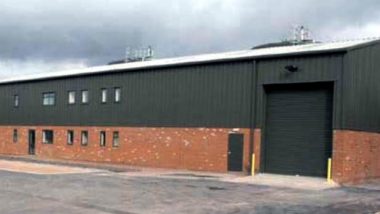Biogas production improvements that raise the yield of methane from any given quantity of biomass fed into an anaerobic digestion plant are the holy grail of AD.
The one thing which, above all else, was holding back the development of anaerobic digestion was the current level of profitability which until the steep energy price rises in 2022, while viable for many businesses in the right set of circumstances, was not adequate for comprehensive adoption of AD everywhere globally.
Improving Biogas Production from Wastewater Treatment Works Thickened Sludge
Wastewater Treatment Works Thickened Sludge is sludge from both the settlement and aeration stages of standard extended aeration process public sewage works that is thickened before being subjected to anaerobic digestion.
During thickening water is removed from the sludge, increasing its concentration. This increased concentration also makes it more suitable for use as a substrate for anaerobic digestion, resulting in more biogas produced from the sludge.
There are numerous advantages to using thickened sludge for biogas production.
The increased concentration of the sludge results in higher biogas yields, which is advantageous for both energy production and economic reasons.
Overall, thickened sludge from Wastewater Treatment has the potential to significantly increase global biogas production.
Biogas production improvements are the key to weaning the biogas industry off subsidies.
That's why we were keen to republish the following article by SEEPEX UK Ltd.
But, before we do so, we would like to point out that before considering biogas yields, it is necessary to select a suitable pump in the first place! Watch our Top Tips for Progressive Cavity Pump Selection video below, to see our tips on how to do that:
All biogas plant operators should find this a useful article to read as the application of this pump technology has applications well-beyond Wastewater Treatment by the Water Utility Companies:
Increasing biogas yields from thickened sludge
By SEEPEX UK Ltd
As the largest water and wastewater treatment company in the UK by geographical area, Anglian Water supplies water and recycling services to over six million domestic customers.

Since the provision of these services is energy-intensive and Anglian Water is committed to a sustainability philosophy, the company has used innovative technology known as HPH to increase the generation of energy from its sewage sludge.
HPH (heating, pasteurisation, hydrolysis) is a unique advanced digestion process that pre-conditions indigenous and imported thickened sludge before anaerobic digestion to produce biogas and biosolids. This treatment leads to better quality biosolids for agricultural use and a five per cent increase in the volume of biogas generated. The system has been developed, trialled and up-scaled to full operational capacity by Anglian Water.
The biogas production challenge
HPH requires thickened sludge at a dry solids (DS) content of 4-8 per cent to be pumped through heat exchangers to raise the temperature to 42ºC before pasteurisation. However, at Anglian Water’s Basildon WwTW, the original lobe pumps installed had a lower-than-expected flow rate and were unable to feed the heat exchanger efficiently when the DS content was over six per cent.
The reason for this is that lobe pumps have a clearance between the rotating lobes and the pump casing, resulting in ‘slip’ when pumping and a reduction in volumetric efficiency, particularly when pumping high-viscosity products.
For Anglian Water, this resulted in blockages in the heat exchanger, poor sludge mixing, variable sludge quality, and a reduction in the expected gas yield from the digesters.
In comparison, progressive cavity pumps have an interference fit between the rotor and stator meaning that slip does not occur. This leads to improved volumetric efficiency which is not affected by the viscosity of the product.
The lobe pumps also had a high maintenance overhead, with full maintenance required every three months, as well as complete overhauls of the heat exchanger when blockages occurred. The cost of the pump overhauls alone was more than £40,000 per year.
The solution
Anglian Water engineers commissioned SEEPEX to supply reliable pump technology which would increase the thickened sludge throughput of the heat exchanger.
After consultation with Anglian Water to fully understand the process and the pump performance required, SEEPEX evaluated a series of elastomer immersion tests. These were used to determine the optimum stator material for the thickened sludge product, and for HPH process conditions.
Progressive cavity (PC) pumps were supplied which could deliver up to 198m³/hr through the heat exchanger to the digesters, even when faced with a variable sludge ds content.
The result
The improved pump performance has resulted in better biogas production.
The pump has provided more even heating of sludge to a higher temperature and a well-mixed, less variable sludge for digestion.
These improvements have seen VFAs (volatile fatty acids) in sludge being fed into the digesters increase by up to 100 per cent compared to the VFA in sludge pumped by lobe pumps.
As VFA is an indicator of final gas yields, the SEEPEX pumps have improved energy production as well as delivering reliable performance.
The pumps have been installed for over 16 months to date (July 2018), requiring no service interventions during this time.
In addition, the heat exchangers have experienced no blockages, reducing downtime as well as saving Anglian Water over £40,000 in maintenance costs.
To date, the SEEPEX PC pumps are delivering [in the words of SEEPEX]:
- 400 per cent longer service life than lobe pumps;
- increased heat exchanger uptime;
- increased gas yield per litre of sludge; and
- increased throughput, resulting in more efficient energy production.
Combined with reduced maintenance costs and a payback of just one year, they are already providing tangible benefits to Anglian Water.
SEEPEX UK Ltd Article Ends
More on Biogas Production
Overview of HPH in Anaerobic Digestion Plants for Better Biogas Production
HPH (heating, pasteurisation, hydrolysis) and similar technologies (such as ultrasonic disintegration) which are being used increasingly in the Wastewater Treatment industry (sewage works application of AD), are not necessarily the way ahead for all AD plants.
Sewage sludges are notoriously hard to break down fully, during anaerobic digestion. Thus the degree of biogas production rate improvement in WwTW applications is much higher than for more easily digested biomass.
Biomass such as food waste and agricultural/ farm waste (with the possible exception of manure) break down much more quickly than WwTW sludges, so HPH may not be strictly necessary in many such instances.
Nevertheless, the SEEPEX pump range has another advantage, and this benefit to biogas production is described below:
SEEPEX BTM Range Open Hopper Pumps Used in Tomato Greenhouse Fermentation

Tomato growers achieve high rates of tomato production by heating and lighting their greenhouses, but that entails high energy requirements.
At the same time, the very efficiency of tomato plant growth results in large quantities of tomato plant stems and foliage, plus many unripe green tomatoes. All of this biomass needs to be responsibly disposed of.
This is a task for which a biogas plant is ideal, not only generating power to supply the greenhouse, but also a fertiliser source for future tomato plants.
SEEPEX installed a BTM range open hopper pump for macerating and conveying the green waste.
Using an integrated cutting unit, the BTM system handles both processes simultaneously. It's an all-in-one solution that simplifies and reduces the cost of the operation.
The cutter’s design optimally chops both the soft tomatoes and the stringy plant parts. Efficient maceration produces the largest surface area within chopped-up biomass, resulting in rapid high bacterial fermentation activity. The result is a high biogas yield and minimised bio-reactor retention times.
Conclusion – Raising Profitability of Biogas Production
Raising the yield of methane and with it, the profitability of biogas is an obvious win-win from any given quantity of biomass fed into an anaerobic digestion plant. That quest, for now, is the holy grail of AD.
There are many ways to raise income from AD facilities. AD plant operators will no doubt use a combination of many individual optimisations on their plants.
Nevertheless, the message is that:
- Progressive Cavity (PC) Pumps may well be worthy of much greater use in the AD industry than has been in the past
- Open Hopper Pumps can provide efficient integration of maceration and pumping optimised biomass into digesters.
All your comments are appreciated below.
[First published 24 August 2019. Updated January 2023.]






Crush it and mush it. That’s the way to do your biogas feed each day.